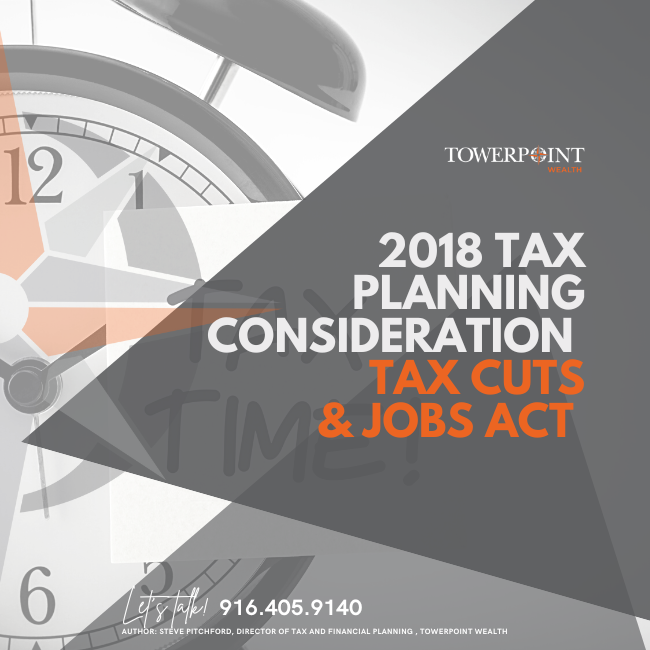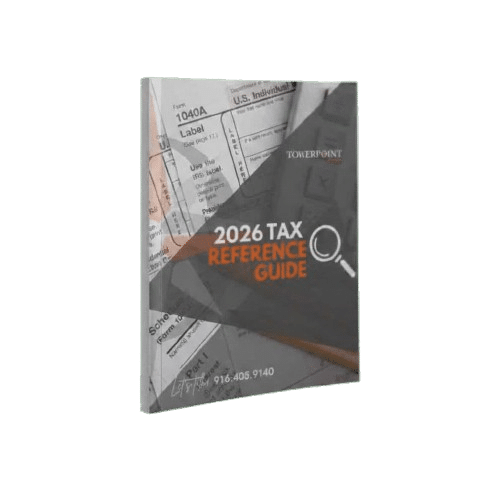
By Steve Pitchford, Director of Tax and Portfolio Planning: Tax Cuts: 2018 Tax Planning Considerations
The Tax Cuts and Jobs Act (TCJA) of 2017 is the most significant amendment to the Federal tax law since 1986, causing drastic changes to both the individual and corporate tax code. Below we describe some of the most pertinent changes and offer tax planning opportunities to consider in response to these changes.
Notable Changes for 2018
By now, most of us are familiar with some of the changes that have taken place at the federal level for both individuals and corporations. On the individual side, one of the most notable differences in 2018 is the removal (or limitation) of many tax deductions. Of special note to those who work in, or who have hired from, the professional service industry (us at Towerpoint Wealth, your CPA, or your estate planning attorney), is the elimination of your ability to deduct professional fees as a miscellaneous itemized expense. And three notable limitations may impact homeowners adversely (especially those in higher tax states such as New York and California) as well:
1. A new cap on the deduction of income, sales, and property taxes to $10,000.
2. The reduction of the interest deduction on mortgage debt. This deduction is now only allowable on debt up to $750,000, down from $1 million previously.
-
- This new rule is only applicable to newly originated mortgages taken out after December 15, 2017.
3. Interest paid on a home equity line of credit (HELOC) is no longer deductible, regardless of when the HELOC was established.
With all of this being said, and speaking to how convoluted our tax code was and continues to be (in our opinion), if a taxpayer had previously been subject to the Alternative Minimum Tax (AMT), a separate tax calculation targeting higher income individuals, the elimination of the deductibility of professional service industry fees, and the limitation of the deduction for income, sales, and property taxes may be of little consequence, as these items were considered “preference” items that had already been added back to taxable income for those “qualifying” for AMT.
High Property Tax States Hit Hard
On the whole, taxpayers residing in high property tax states such as California and New York very well may feel more of the sting of the TCJA. New York Governor Andrew Cuomo estimates the new tax act will raise property and income taxes for New Yorkers by 20 percent! California Governor Jerry Brown, commenting on the reduced mortgage interest deduction in particular, stated that this provision would disproportionally affect California.
Not surprisingly, California is leading the charge in considering different approaches to mitigate TCJA’s impact on its residents. Ideas include:
- Allowing employers to withhold state income taxes as payroll taxes.
- Allowing taxpayers to gift their state income taxes to the state, thus making them deductible as charitable contributions.
These ideas being said, there are major hurdles with these approaches, and we feel the likelihood the Internal Revenue Service (IRS) readily accepts them to be quite low.
Planning Opportunities to Consider
Tax Cuts: Understanding the myriad of moving parts associated with the Tax Cuts and Jobs Act of 2017, we here at Towerpoint Wealth continue to be resolute in our philosophy of helping our clients be proactive rather than reactive with their tax planning, and there are still plenty of planning opportunities to consider, obviously depending on your unique tax situation. Examples of proactive tax planning ideas include:
- Reevaluate which accounts your Towerpoint Wealth professional service and advisory fees are being debited from.
- These professional fees are no longer tax deductible.
- Reviewing whether deducting these fees directly from pre-tax retirement accounts (e.g.Traditional IRAs, but NOT Roth IRAs) would be time well spent, as doing so may effectively provide a tax-free distribution from these accounts.
- Frontload charitable contributions into a single tax year.
- For those who are charitably inclined, taxpayers continue to receive a federal and state income tax deduction for any donations made to approved 501(c)(3) charitable organizations.
- The TCJA created a higher standard deduction (doubled for most taxpayers beginning in 2018), and many taxpayers may need to make a more sizeable charitable contribution in order to receive the deduction benefit.
- One possible solution is frontloading charitable contributions into a single tax year (this would be even more impactful in a year where taxable income may be expected to be higher).
- Any charitable contributions not applied or “used” in any particular tax year can still be carried forward five more years.
- Make a Qualified Charitable Distribution (QCD) from your traditional IRA account.
- Available for those who are 70 ½ years old or older, and subject to required minimum distributions (RMDs) from their traditional IRAs.
- Rather than make a donation of cash or investments from a “regular” taxable account (i.e. a checking, savings, or brokerage account), a taxpayer obligated to taking a RMD can make a direct contribution from their traditional IRA account to the charity, up to their RMD amount.
- This is known as a Qualified Charitable Distribution (QCD), which has a dual benefit of both satisfying the taxpayer’s RMD, while excluding the distribution amount from taxable income.
- From a tax perspective, a QCD has the potential to achieve virtually the same impact as donating funds from a taxable account, but is not subject to the standard deduction “hurdle” as discussed above.
We Are Here to Help
In the end, while the TCJA and the hastily-assembled manner it was enacted left many taxpayers confused and frustrated, we at Towerpoint Wealth believe there are a number of planning opportunities worth evaluating. We understand that “talking taxes” is not everyone’s ideal topic of conversation, yet an important one to be having, and we are here to directly facilitate that conversation and make it less painful as you formulate a tax strategy for 2018 and beyond. If you would like to speak further about any of the topics covered in this article, we encourage you to call (916-405-9140) email (info@towerpointwealth.com), or Tweet (@twrpointwealth) us.
Are you searching “certified financial planner near me?” You’ve found Sacramento independent financial planner Joseph Eschleman, as well as certified financial planner Steve Pitchford, CPA, CFP®, and our entire independent wealth management team.
We serve clients primarily in the Northern California region. Glad you’re here! Please contact us with any questions you have about our wealth management services.







